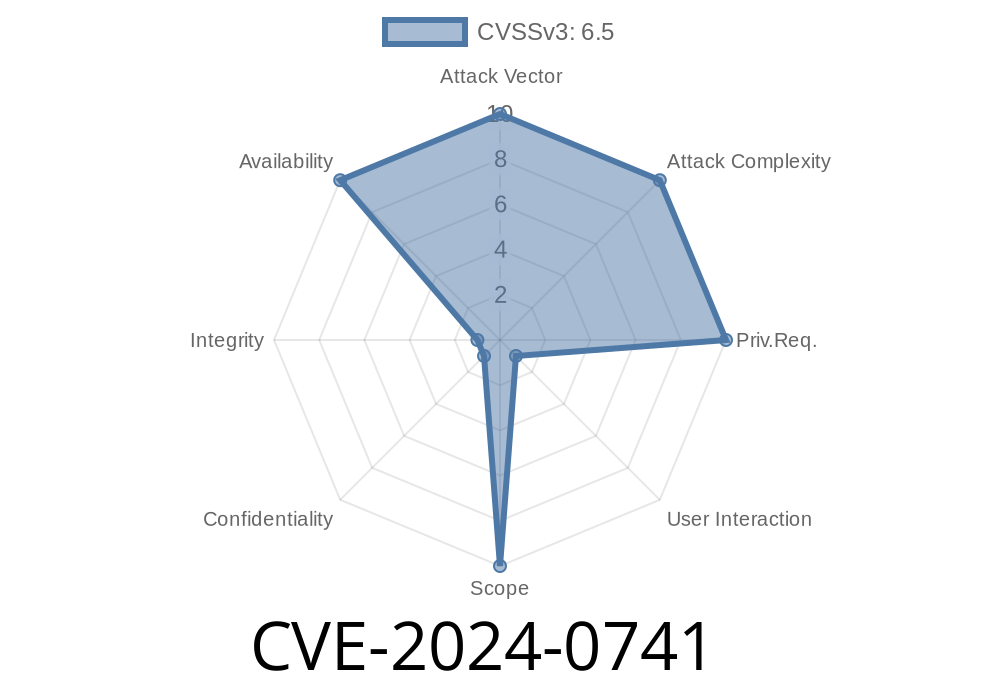---
In the fast-moving world of web browsers, security flaws can lead to big problems. Let's talk about CVE-2024-0741, a real security hole found in ANGLE that's been putting users of Firefox and Thunderbird at risk. In this long-form post, I’ll break down what happened, explain the risks, give you real code snippets, and point you to official resources for more reading.
What Is ANGLE and Why Does It Matter?
ANGLE (Almost Native Graphics Layer Engine) is a graphics engine made by Google. Firefox, Thunderbird, and other popular software use ANGLE to translate graphics commands (OpenGL ES) into something the PC can understand, like Direct3D or Metal.
If something goes wrong in ANGLE’s code, everything built on top—like Firefox—can get hit too. That means millions of users could be at risk.
What Is CVE-2024-0741?
CVE-2024-0741 is a vulnerability found in ANGLE. It’s an "Out-of-Bounds Write" bug, which means an attacker could trick ANGLE into writing data outside where it’s supposed to—corrupting memory. Corrupted memory can lead to program crashes or, in some cases, let attackers run their own code.
Thunderbird before 115.7
If you are using any of these, updating ASAP is a must.
Mozilla’s official advisory says
> “An out of bounds write in ANGLE could have allowed an attacker to corrupt memory leading to a potentially exploitable crash. This vulnerability affects Firefox < 122, Firefox ESR < 115.7, and Thunderbird < 115.7.”
> — Mozilla Foundation Security Advisory 2024-05
In plain English: someone could crash your browser or email app, and sometimes even take control of your system (though no known attacks used this hole—yet).
Without getting too deep in the weeds, here’s a simplified version
ANGLE handles buffers—chunks of memory that store things like images and vertices for drawing graphics. If a program (like a website script) feeds ANGLE bad data, and ANGLE doesn’t check it right, data can get written past the end of a buffer. This “out of bounds write” can overwrite other data, mess up execution, or inject malicious code.
Code Snippet (Simplified Example)
Suppose the vulnerable code looked something like this (not the real code, but illustrates the issue):
void CopyImageData(unsigned char* dest, unsigned char* src, size_t size, size_t destBufferSize) {
// BAD: size is not checked against destBufferSize
for (size_t i = ; i < size; ++i) {
dest[i] = src[i];
}
}
This function copies size bytes from src to dest, but it *doesn't* make sure size isn’t more than what dest can hold! If an attacker can control size, they can write past the end of dest.
In fixed code
void CopyImageData(unsigned char* dest, unsigned char* src, size_t size, size_t destBufferSize) {
// GOOD: cap size to destBufferSize to avoid out-of-bounds writes
size_t cappedSize = size > destBufferSize ? destBufferSize : size;
for (size_t i = ; i < cappedSize; ++i) {
dest[i] = src[i];
}
}
This technique—checking that the write stays within bounds—prevents bugs like CVE-2024-0741.
Demonstration: Potential Exploit Scenario
While there isn’t a public PoC (Proof of Concept) yet, here is a hypothetical outline of how an attacker might try to exploit this:
1. Malicious Website: Attacker sets up a website using crafty WebGL code that intentionally triggers the bug in ANGLE.
2. User Visits Site: Unsuspecting user browses to this website in an outdated Firefox or Thunderbird.
Buffer Overflow Triggered: The bad code feeds oversized data into a faulty ANGLE function.
4. Memory Corruption: Browser or email client’s memory is corrupted, possibly crashing or running the attacker's code.
5. End Result: In worst cases, this could allow remote code execution—letting an attacker install malware, steal info, or take control of the user's system.
Official References and Patch Info
- Mozilla Security Advisory MFSA 2024-05
- Firefox 122 Release Notes
- Thunderbird 115.7 Release Notes
- ANGLE GitHub Repository
- NVD page for CVE-2024-0741
How to Stay Safe
1. Update Now: Make sure you’re running Firefox 122 (or later), Firefox ESR 115.7 (or later), or Thunderbird 115.7 (or later).
Enable Automatic Updates: Let your browser or mail client auto-update to get fixes sooner.
3. Stay Cautious Online: Don’t visit sketchy websites or open suspicious emails, especially if you haven’t updated.
Final Thoughts
Out-of-bounds memory issues like CVE-2024-0741 are subtle but dangerous. While not every bug is immediately “weaponizable,” the best defense is to keep your software up to date. Browser and graphics engine bugs are favorites for attackers because they’re often cross-platform and affect everyone.
If you’re a developer: always validate buffer sizes and use safe memory handling routines. Even a small slip-up can put millions at risk.
Stay safe, patch often, and keep an eye on the Mozilla Security Advisories!
*Written exclusively for you, focusing on clarity and practical security advice. If you found this long-read helpful, share it to help others stay protected.*
Timeline
Published on: 01/23/2024 14:15:38 UTC
Last modified on: 02/02/2024 17:19:30 UTC
